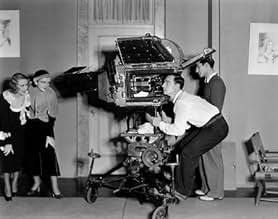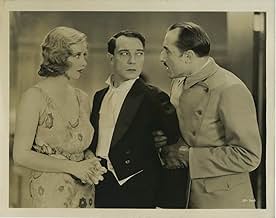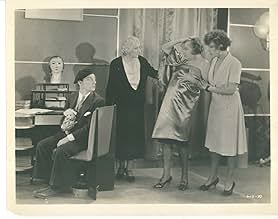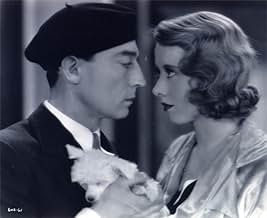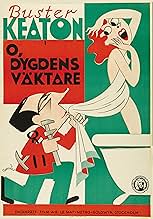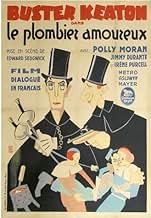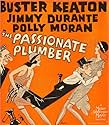To make her lover jealous, a beautiful socialite passes off a bumbling plumber as her paramour.To make her lover jealous, a beautiful socialite passes off a bumbling plumber as her paramour.To make her lover jealous, a beautiful socialite passes off a bumbling plumber as her paramour.
- Awards
- 4 wins total
Edward Brophy
- Man Outside Beauty Parlor
- (uncredited)
Heinie Conklin
- Hunter with Rifle at Duel
- (uncredited)
Carl M. Leviness
- Casino Patron
- (uncredited)
Fred Malatesta
- Tony's Second
- (uncredited)
Rolfe Sedan
- Tony's Second
- (uncredited)
Stanhope Wheatcroft
- Casino Patron
- (uncredited)
Florence Wix
- Casino Patron
- (uncredited)
5.9663
1
2
3
4
5
6
7
8
9
10
Featured reviews
More of a sex farce than a typical Keaton comedy
Not hilarious but pretty funny, with Jimmy Durante, Gilbert Roland and the three female leads of Moran, Maris and Purcell providing much of the comedy.
Weird and at times a little stupid, some good laughs; but the last reel is not as hilariously frantic as in other Keaton films.
Weird and at times a little stupid, some good laughs; but the last reel is not as hilariously frantic as in other Keaton films.
Carry On Buster
Now that was actually good -- I could stand to watch a lot more of those!
The last thirty seconds or so form a too-convenient "eh?--what?" conclusion, the initial set-up is slow, and Jimmy Durante seems to have wandered into a rather pointless supporting role from another movie altogether; but for the first time in talkies we have Buster back as of old -- alert, expressive, and ever-so-slightly bemused as his life unexpectedly intersects with that of a flighty socialite who is the target of a cad -- and the return is worth celebration. It will take all his trademark patience, agility and ingenuity to fulfil the contract to protect his new 'employer' both from her would-be seducer and from her own weaker moments... but "Maybe some day you'll be glad I was here," he tells her with a touching stubbornness, and true to his word it is he who contrives the final confrontation.
In a sense this is just as much farce as was "Parlor, Bedroom and Bath": but the script is better, the supporting cast is much better, and Keaton himself more than holds his own where both dialogue and speaking glances are concerned. He may be playing another 'Elmer', but his character here is a far cry from the pathetic buffoon of his first speaking role in "Free and Easy"; Elmer Tuttle, plumber and inventor, may be out of his element in Miss Patricia's social circles, but he is full of resource and determination, and no helpless puppet. The result, predictably, is far more effective -- when Reggie Irving's head nestles on a concerned female bosom, it is through mere ineptitude, but when Buster here avails himself of the same proffered rest in the aftermath of the duel, it is a visible decision to take full advantage of the opportunity! And as ever with Keaton, many of the most hilarious moments are unspoken. His ever-helpful provision of ammunition to the incensed ladies as events catch up with Tony, a scene which had me in stitches; his attempt to conceal a ridiculously fluffy lap-dog in his pocket, with the whole surreal episode the supremely logical culmination of many earlier plot twists, a set-up worthy of any of his silent features; the arrival of Aunt Charlotte, and his inspired solution to the crisis; and of course the whole duel sequence.
The entire production, from script to sight-gags, is somewhat reminiscent of the classic "Carry On" comedies of the 1960s -- and as a longstanding fan of the latter I mean that as nothing more than a thoroughly-going recommendation. It's very easy to mentally substitute Sid James into the Durante role (arguably an improvement...), Joan Sims as Patricia, and Hattie Jacques as Aunt Charlotte, and oddly enough Buster seems entirely at home in such company. But what I hadn't realised is that the actual duel sequence in the Scarlet Pimpernel spoof "Carry On Don't Lose Your Head" -- including the hero's famous offer "You have the swords, I'll have the pistols" -- is a direct homage to this film; Buster, of course, did it all first.
"The Passionate Plumber" is a true sound comedy, adapted from a stage property, but in addition it's a genuine Keaton movie in ways that "Speak Easily" or "Parlor, Bedroom and Bath", for example, are not. The MGM talkies tend to treat physical comedy as the lowest form of humour, utilising pratfalls, entanglements with scenery and general bumbling to milk the audience for routine, predictable laughs. In this film, for the first time since "Doughboys" and with more consistent results, we see the return of Keaton's own unexpected inventiveness, with the 'Aunt Charlotte' scene as perhaps the most memorable example: in a standard farce, Elmer would be hiding in a creaking cupboard or frantically climbing out of a window at this point, but it wouldn't get one-half the laugh that Keaton's straight-faced expedient does, not to mention the inspired improvisation that follows.
For once, we have Buster back in problem-solving mode, overcoming obstacles and pitting his wits against the world, and it's enough to bring a whole extra sparkle for this viewer at least. He has, of course, fallen in unspoken love with the leading lady -- but that certainly doesn't mean he's going to allow her, or anyone else, to walk all over him! Competent, coherent characters always seem to suit his style better than witless stumblers, producing superior comic results, and this film simply reinforces the point; it isn't a run-of-the-mill MGM picture, and it's distinctly funnier for it.
Keaton himself apparently didn't feel that either the film or the role were right for him. As in, famously, the case of "The High Sign" -- which he actually suppressed from initial release as substandard -- I honestly believe that in this case he was wrong: much of the film depends entirely on his interpretation, many of the laughs derive directly from his reactions and timing, and the material provides opportunity for the full range of his talents. And above all, it had me laughing by the end with the sort of helpless delight I haven't experienced from any of his other sound productions...
The last thirty seconds or so form a too-convenient "eh?--what?" conclusion, the initial set-up is slow, and Jimmy Durante seems to have wandered into a rather pointless supporting role from another movie altogether; but for the first time in talkies we have Buster back as of old -- alert, expressive, and ever-so-slightly bemused as his life unexpectedly intersects with that of a flighty socialite who is the target of a cad -- and the return is worth celebration. It will take all his trademark patience, agility and ingenuity to fulfil the contract to protect his new 'employer' both from her would-be seducer and from her own weaker moments... but "Maybe some day you'll be glad I was here," he tells her with a touching stubbornness, and true to his word it is he who contrives the final confrontation.
In a sense this is just as much farce as was "Parlor, Bedroom and Bath": but the script is better, the supporting cast is much better, and Keaton himself more than holds his own where both dialogue and speaking glances are concerned. He may be playing another 'Elmer', but his character here is a far cry from the pathetic buffoon of his first speaking role in "Free and Easy"; Elmer Tuttle, plumber and inventor, may be out of his element in Miss Patricia's social circles, but he is full of resource and determination, and no helpless puppet. The result, predictably, is far more effective -- when Reggie Irving's head nestles on a concerned female bosom, it is through mere ineptitude, but when Buster here avails himself of the same proffered rest in the aftermath of the duel, it is a visible decision to take full advantage of the opportunity! And as ever with Keaton, many of the most hilarious moments are unspoken. His ever-helpful provision of ammunition to the incensed ladies as events catch up with Tony, a scene which had me in stitches; his attempt to conceal a ridiculously fluffy lap-dog in his pocket, with the whole surreal episode the supremely logical culmination of many earlier plot twists, a set-up worthy of any of his silent features; the arrival of Aunt Charlotte, and his inspired solution to the crisis; and of course the whole duel sequence.
The entire production, from script to sight-gags, is somewhat reminiscent of the classic "Carry On" comedies of the 1960s -- and as a longstanding fan of the latter I mean that as nothing more than a thoroughly-going recommendation. It's very easy to mentally substitute Sid James into the Durante role (arguably an improvement...), Joan Sims as Patricia, and Hattie Jacques as Aunt Charlotte, and oddly enough Buster seems entirely at home in such company. But what I hadn't realised is that the actual duel sequence in the Scarlet Pimpernel spoof "Carry On Don't Lose Your Head" -- including the hero's famous offer "You have the swords, I'll have the pistols" -- is a direct homage to this film; Buster, of course, did it all first.
"The Passionate Plumber" is a true sound comedy, adapted from a stage property, but in addition it's a genuine Keaton movie in ways that "Speak Easily" or "Parlor, Bedroom and Bath", for example, are not. The MGM talkies tend to treat physical comedy as the lowest form of humour, utilising pratfalls, entanglements with scenery and general bumbling to milk the audience for routine, predictable laughs. In this film, for the first time since "Doughboys" and with more consistent results, we see the return of Keaton's own unexpected inventiveness, with the 'Aunt Charlotte' scene as perhaps the most memorable example: in a standard farce, Elmer would be hiding in a creaking cupboard or frantically climbing out of a window at this point, but it wouldn't get one-half the laugh that Keaton's straight-faced expedient does, not to mention the inspired improvisation that follows.
For once, we have Buster back in problem-solving mode, overcoming obstacles and pitting his wits against the world, and it's enough to bring a whole extra sparkle for this viewer at least. He has, of course, fallen in unspoken love with the leading lady -- but that certainly doesn't mean he's going to allow her, or anyone else, to walk all over him! Competent, coherent characters always seem to suit his style better than witless stumblers, producing superior comic results, and this film simply reinforces the point; it isn't a run-of-the-mill MGM picture, and it's distinctly funnier for it.
Keaton himself apparently didn't feel that either the film or the role were right for him. As in, famously, the case of "The High Sign" -- which he actually suppressed from initial release as substandard -- I honestly believe that in this case he was wrong: much of the film depends entirely on his interpretation, many of the laughs derive directly from his reactions and timing, and the material provides opportunity for the full range of his talents. And above all, it had me laughing by the end with the sort of helpless delight I haven't experienced from any of his other sound productions...
Laurel and Hardy type humour
I have never seen nor want to see a silent Buster Keaton film so came to this without any preconceptions or anti-talkie prejudice. To me this very much has the feel of a Laurel and Hardy picture. Well made silly gentle slapstick.
When you read that this was adapted from a stage play, you're right to approach with caution but you don't need to worry about this. It's not one of those awful filmed stage plays - this was properly adapted into a proper film with a cinematic rather than a theatric script.
If you're ok with the somewhat acquired taste of American 1930s comedy acting and like Stan and Ollie, you'll probably enjoy this. Unlike many early thirties comedies, the characters are, although not realistic, actually engaging. You're interested in them, you want to know what happens to them. So often that acting style creates characters so unbelievable that you can't accept them as real people. The protagonists here however, like you find in L&H films, manage that perfect balance of absurdly with likeability.
Buster Keaton purists don't like this - it's not their Buster! Like when The Marx Brothers went to MGM and became what MGM wanted them to be, Buster Keaton became Thalberg's neutered befuddled pet. I've no problem with that. As a stand alone picture, to someone who doesn't watch silent movies, this Buster is perfect for a film like this.
His co-star is the acclaimed stage actress Irene Purcell and like Keaton, she is perfect in this too. It was, and still is rare to find an actress in the movies who is allowed be genuinely as funny as the male comedian, not just his pretty foil. She completely captures your attention and that's not just because she's so stunningly and staggeringly attractive, she has real comedy talent and this picture allows her to demonstrate this without the usual constraints of the time.
When you read that this was adapted from a stage play, you're right to approach with caution but you don't need to worry about this. It's not one of those awful filmed stage plays - this was properly adapted into a proper film with a cinematic rather than a theatric script.
If you're ok with the somewhat acquired taste of American 1930s comedy acting and like Stan and Ollie, you'll probably enjoy this. Unlike many early thirties comedies, the characters are, although not realistic, actually engaging. You're interested in them, you want to know what happens to them. So often that acting style creates characters so unbelievable that you can't accept them as real people. The protagonists here however, like you find in L&H films, manage that perfect balance of absurdly with likeability.
Buster Keaton purists don't like this - it's not their Buster! Like when The Marx Brothers went to MGM and became what MGM wanted them to be, Buster Keaton became Thalberg's neutered befuddled pet. I've no problem with that. As a stand alone picture, to someone who doesn't watch silent movies, this Buster is perfect for a film like this.
His co-star is the acclaimed stage actress Irene Purcell and like Keaton, she is perfect in this too. It was, and still is rare to find an actress in the movies who is allowed be genuinely as funny as the male comedian, not just his pretty foil. She completely captures your attention and that's not just because she's so stunningly and staggeringly attractive, she has real comedy talent and this picture allows her to demonstrate this without the usual constraints of the time.
This film ushers in a dark, dark period for Buster Keaton fans
This movie marks the darkest period for Buster Keaton and his fans. While the transition to sound for Keaton was very poor (after all, MGM studios tried to make this great mime a talking star), the PASSIONATE PLUMBER marks the beginning of the end of Keaton's career. That's because this was the first of three films that paired Keaton with Jimmy Durante--a "comedian" whose style was the exact opposite of Keaton's. Keaton's humor was physical and sweet, while Durante was extremely loud and overbearing and the two styles meshed like oil and water. It was obvious that the execs at MGM had no idea what to do with Keaton and pairing him with Durante was a sign that they had "jumped the shark"--in other words, they were trying desperate measures to try to salvage a career that had already peaked.
Now this isn't to say that Keaton couldn't have been funny. Had his films remained true to his strengths (physical humor and a general likability), he could have remained a viable star. Chaplin did this by refusing to immediately switch to sound films--making CITY LIGHTS (1931) and MODERN TIMES (1936) as silent movies even when everyone had switched to sound long before these films. It's really too bad that MGM didn't do what they did with Laurel and Hardy. This team did work for MGM technically speaking, but MGM allowed the affiliated Hal Roach Studio almost complete independence to do what they knew how to do best. Perhaps if Keaton had been sent to Roach, his sound career would have been a success. But with the gag writers at MGM, he was sunk.
This film is worse than his previous sound outings because Keaton is given almost no physical gags at all. The few that he does have are among the best moments in the film because they are genuine--gags that suit Keaton's style. But the rest of the film is so talky and forgettable that it will most likely make Keaton fans (like myself) wince. And, while I know some Durante fans might take offense, he came off as just obnoxious and annoying!
The film is called the PASSIONATE PLUMBER, though Keaton spends very little time plumbing. The beginning of the film involves more scenes with Durante and Keaton--while the last half of the film they don't appear in that many scenes together (thank goodness). During this phase of the film, Keaton mostly annoys those around him and is invited to a series of duels due to his incessant and annoying bumbling. For the remainder of the film, he tags along with a young woman as her aide. She has gotten him to promise never to leave her side because she's afraid she'll lose control and allow Gilbert Rolland to make love to her. So, through over half the film, you see Keaton essentially following her and that's all there is to the plot.
Sadly throughout all of this, there are almost no laughs at all--a serious problem with a comedy! Only at the very end, when it degenerates to slapstick, does the film show any promise--but then the final credits roll and you are left thinking "is that all there is?".
Now this isn't to say that Keaton couldn't have been funny. Had his films remained true to his strengths (physical humor and a general likability), he could have remained a viable star. Chaplin did this by refusing to immediately switch to sound films--making CITY LIGHTS (1931) and MODERN TIMES (1936) as silent movies even when everyone had switched to sound long before these films. It's really too bad that MGM didn't do what they did with Laurel and Hardy. This team did work for MGM technically speaking, but MGM allowed the affiliated Hal Roach Studio almost complete independence to do what they knew how to do best. Perhaps if Keaton had been sent to Roach, his sound career would have been a success. But with the gag writers at MGM, he was sunk.
This film is worse than his previous sound outings because Keaton is given almost no physical gags at all. The few that he does have are among the best moments in the film because they are genuine--gags that suit Keaton's style. But the rest of the film is so talky and forgettable that it will most likely make Keaton fans (like myself) wince. And, while I know some Durante fans might take offense, he came off as just obnoxious and annoying!
The film is called the PASSIONATE PLUMBER, though Keaton spends very little time plumbing. The beginning of the film involves more scenes with Durante and Keaton--while the last half of the film they don't appear in that many scenes together (thank goodness). During this phase of the film, Keaton mostly annoys those around him and is invited to a series of duels due to his incessant and annoying bumbling. For the remainder of the film, he tags along with a young woman as her aide. She has gotten him to promise never to leave her side because she's afraid she'll lose control and allow Gilbert Rolland to make love to her. So, through over half the film, you see Keaton essentially following her and that's all there is to the plot.
Sadly throughout all of this, there are almost no laughs at all--a serious problem with a comedy! Only at the very end, when it degenerates to slapstick, does the film show any promise--but then the final credits roll and you are left thinking "is that all there is?".
Not Keaton's best work, but interesting to see Durante and Maris
A weak plot, tired gags, and repetitiveness make this certainly one of Keaton's lesser efforts. It is amusing to see him running around (as it always is for me), such as early on when he races up the stairs with the maid. He has a duel scene, not doesn't quite getting the concept of the glove's use in a challenge. His first response is to whip the bath towel that he's using to cover himself with to slap his challenger back, as we hear the lady of the house shriek. Later he slaps people indiscriminately when they annoy him, and then instead of pacing the other direction in the duel, walking behind his opponent. I also liked his scenes with the little dog, and how he created his own stethoscope out of plumber's tools.
It was also interesting to see him paired with Jimmy Durante. Durante's nose takes some abuse which tickled me, and while he has his share of groaners in the film, his energetic delivery, punctuated with a sidelong glance, open mouth, and "haaaaa!", is endearing. Some of his better quips: "It'll be the greatest invention since Einstein discovered them relatives!" "Say, he's no bargain - that guy has done more chiselin' than Rodin!" "Don't I always stand at attention when they play The Mayonnaise?" (they're in France, so punning for Marseilles)
Lastly, Mona Maris, an actress from Argentina, really jumps off the screen in her supporting role. She's stunning, though the bit that has her throwing plates and whatnot out of anger in consecutive scenes got old pretty quickly. The other actors, Irene Purcell and Gilbert Roland, were less compelling. Having Roland be a cad who is seeing two women and telling each that he's married to the other, so that he can't possibly get married, and then Keaton being used in retaliation to make him jealous is an interesting idea, but it's poorly executed. Watchable for Keaton, Durante, or Mona Maris fans only.
It was also interesting to see him paired with Jimmy Durante. Durante's nose takes some abuse which tickled me, and while he has his share of groaners in the film, his energetic delivery, punctuated with a sidelong glance, open mouth, and "haaaaa!", is endearing. Some of his better quips: "It'll be the greatest invention since Einstein discovered them relatives!" "Say, he's no bargain - that guy has done more chiselin' than Rodin!" "Don't I always stand at attention when they play The Mayonnaise?" (they're in France, so punning for Marseilles)
Lastly, Mona Maris, an actress from Argentina, really jumps off the screen in her supporting role. She's stunning, though the bit that has her throwing plates and whatnot out of anger in consecutive scenes got old pretty quickly. The other actors, Irene Purcell and Gilbert Roland, were less compelling. Having Roland be a cad who is seeing two women and telling each that he's married to the other, so that he can't possibly get married, and then Keaton being used in retaliation to make him jealous is an interesting idea, but it's poorly executed. Watchable for Keaton, Durante, or Mona Maris fans only.
Did you know
- TriviaMGM's first attempt to promote Buster Keaton and Jimmy Durante as a comedy team. The other two pairings of Keaton and Durante are Speak Easily (1932) and What-No Beer? (1933).
- GoofsWhen Elmer provides a tray of plates for Nina and Patricia to throw at Tony, some of them crack apart as they are lifted up off the tray, revealing that they are not real plates but special break-away plates.
- Quotes
Tony Lagorce: [meeting for a duel with Elmer] Anything! Swords. Pistols. I don't care. I'll kill him anyway.
McCracken: What's the difference? Swords, pi...
Elmer: Satisfy both sides. Let him have a sword and I'll use a pistol.
- ConnectionsAlternate-language version of Le plombier amoureux (1932)
Details
- Release date
- Country of origin
- Languages
- Also known as
- El amante improvisado
- Filming locations
- Paris, France(opening establishing shots)
- Production company
- See more company credits at IMDbPro
- Runtime
- 1h 13m(73 min)
- Color
- Aspect ratio
- 1.20 : 1
Contribute to this page
Suggest an edit or add missing content

